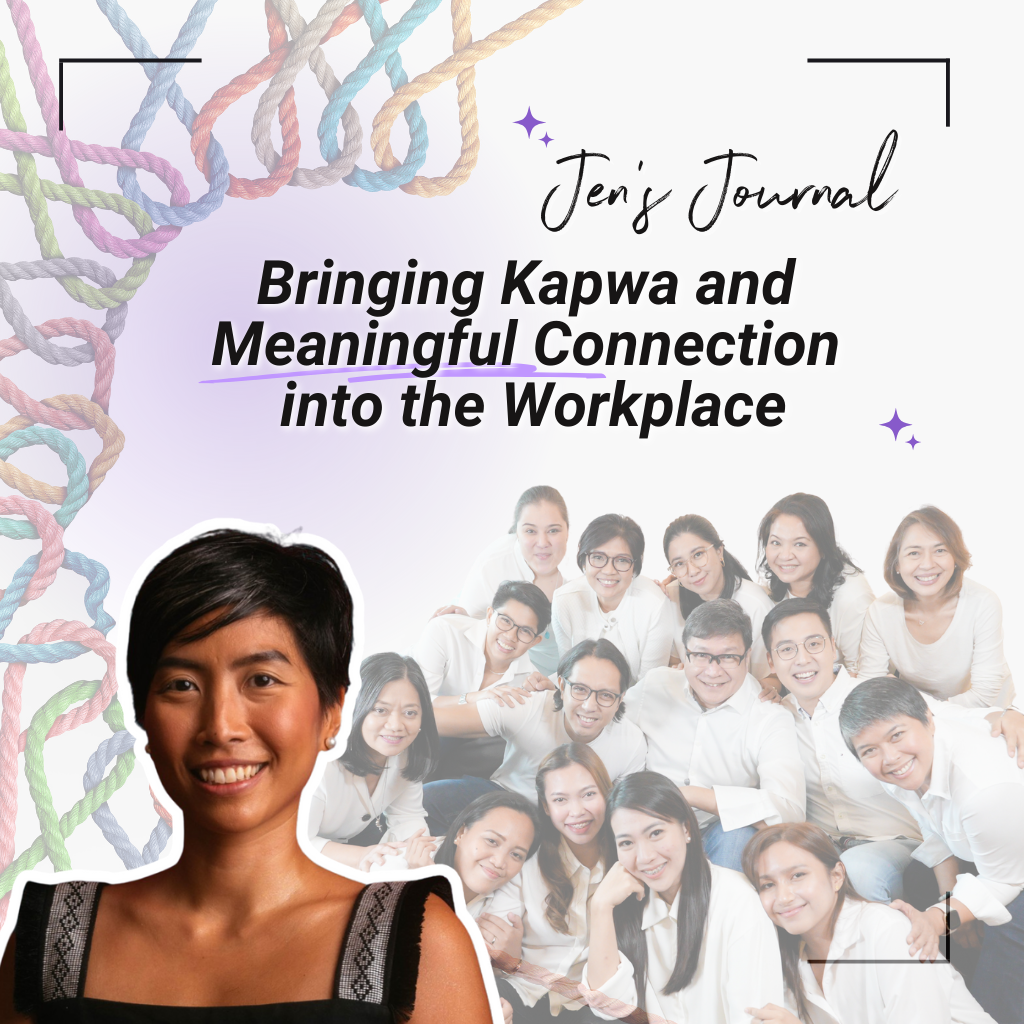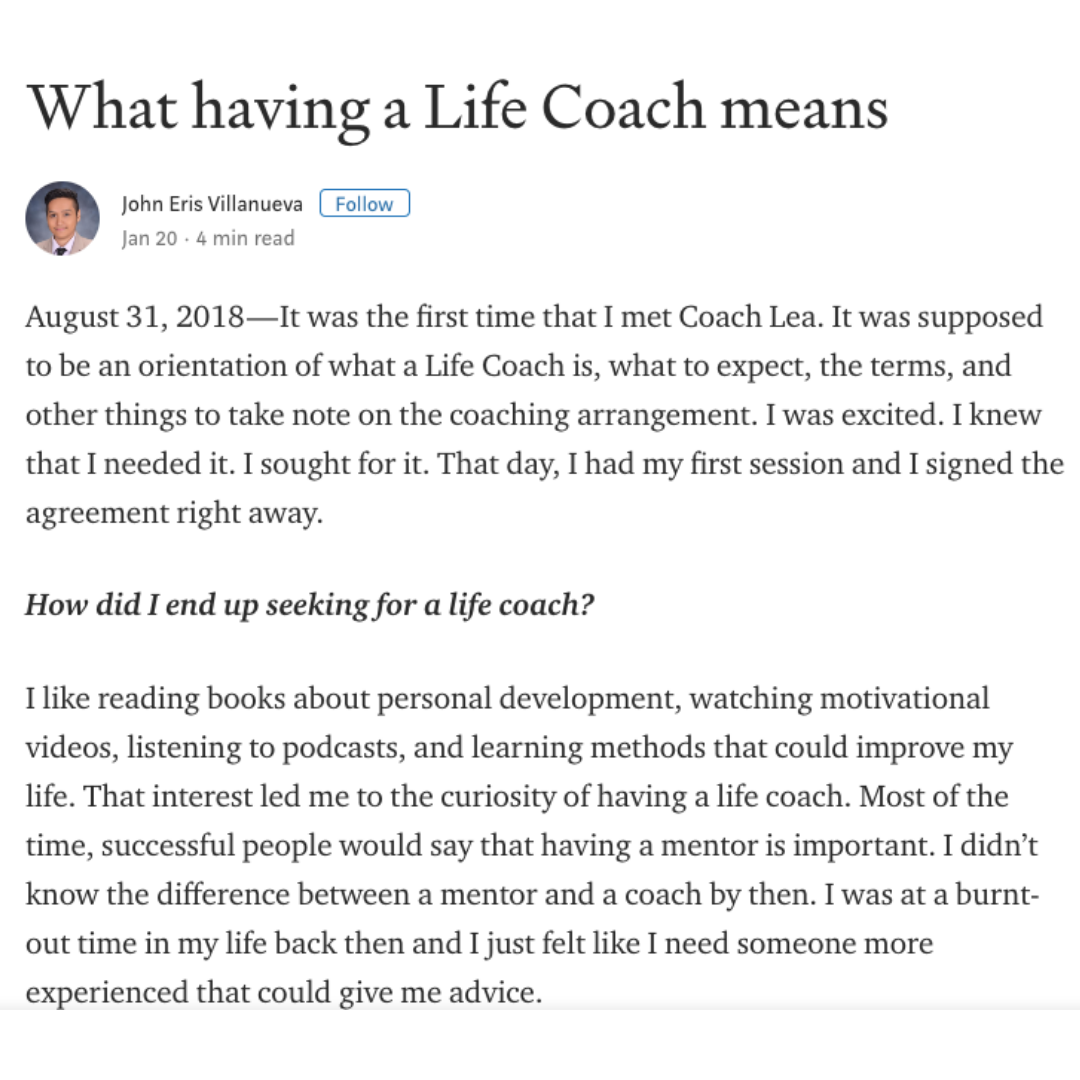
Bringing Kapwa and Meaningful Connection Into the Workplace
Since I started coaching with Haraya in 2021, and when I started co-producing and writing episodes for The Imaginable Workplace podcast, I’ve thought quite a bit about what makes a workplace feel truly alive. Not just busy or productive, but genuinely alive—with people who feel they belong, who are comfortable showing up as their full selves, and who actually enjoy working together. For me, a big part of that has to do with kapwa, meaning “fellow being” (as opposed to “other”), a concept from Filipino psychology or Sikolohiyang Pilipino.
Kapwa is about recognizing our shared humanity; understanding that we’re all connected. At its deepest level, kapwa is about valuing justice, dignity and freedom, and this is reflected in the intentions and aspirations of maka-kapwang ugnayan. (1) It’s seeing each other as whole people, not just as coworkers or email signatures. Interestingly, “Haraya” in Swahili means pride, dignity, and freedom, which feels like a nice fit for what kapwa is all about, too.
So, how might we create more of this kind of culture at work?
Kapwa: A Different Way of Relating
In a previous article I wrote, I explored how kapwa is an invitation to really see each other—to go beyond the roles and titles, and connect on a human level (1).
When I think about the places where I’ve felt the most connected at work, it’s always been because someone took the time to listen or show a little kindness. It’s about simple things: asking how someone is really doing, or taking a moment to appreciate their specific efforts. These small actions can transform how we feel about where we work and who we work with.
This also surfaced in some of the conversations we’ve had on the podcast, such as episodes with Jun Cabochan of Pandayan Bookstore sharing his Diwa at Kapwa approach to management (2), and Jen Garcia of Zuellig sharing the simple practice of asking someone how they’re doing, and really asking it again like we mean it. (3)
Connection: The Backbone of Strong, Healthy Teams
In today’s fast-paced and often remote workplaces, meaningful connection can feel like a luxury. But I’d argue it’s essential. When people feel truly connected, they feel safe enough to bring their ideas to the table, to collaborate freely, and to express themselves honestly.
We can take cues from nature on the value of connection.In nature, “mycelium, the thread-like formation that makes up most fungi, connects roots to one another, allowing plants and trees to communicate with one another to create healthier ecosystems. It forms the largest network — a mycorrhizal network, a “wood-wide web” — beneath the earth.” (4).
When we create an environment where people can speak up, feel that their voices matter and are heard, we strengthen an underground root system that can help us weather storms as a team. That doesn’t happen by accident; it happens when we make intentional space for real conversations, show up with authenticity, and lead with empathy. (5).
Creating a Culture of Belonging and Wellbeing
Wellbeing is something we often think about in terms of physical or mental health, but it’s also deeply social. In another article, I explored how our wellbeing is connected to the relationships we build and the communities we’re part of (6). When we feel connected to others, we feel more at ease, more energized, and more able to face challenges. This involves a shared practice of pakikipagkapwa.
What might this look like?
- Start conversations that matter: Make time for real talk—whether it’s during team check-ins or over coffee. Ask questions that go beyond “How are you?” and invite people to share their stories.
- Practice mindful listening: It sounds obvious, but really listening—without interrupting or thinking about what to say next—can be a game-changer. It shows people you care about what they have to say.
- Celebrate diversity and shared humanity: Acknowledge the unique contributions each person brings, but also find those common threads that connect us all. We all want to feel seen and appreciated.
- Lead with vulnerability and care: Whether you’re a leader or a teammate, opening up about your own challenges creates space for others to be themselves too. Small gestures, like checking in or offering help, can also build a culture where people feel genuinely cared for and connected.
As you think about these practices and your own current habits, you can reflect on the following questions:
- What is my mindset when it comes to connecting with my team?
- When listening in conversations, do I pay attention to how I’m listening? Do I listen with a focus on myself or my kapwa?
- What threads connect me with my team? What differences can I celebrate?
- What does support from my team and my leaders look like to me?
- What does support for my team and my leaders look like to them?
Moving Forward with Kapwa and Haraya
Embracing kapwa and the spirit of Haraya isn’t about overhauling the entire workplace overnight. It’s about intentional, everyday choices that help us see each other more clearly, listen more deeply, and connect more meaningfully. These values aren’t just cultural concepts—they’re practical tools we can use to create workplaces that are more inclusive, creative, and alive (4); cultures where we co-vision our imaginable workplace and co-create it with purpose and consistency over time.
What might cultivating this kind of culture unlock for you and your organization?
Learn more about how to make your imaginable workplace a reality with Haraya’s organizational transformation programs for leadership, culture-building and wellbeing here.
***
Jen Horn is a facilitator, coach and writer, born and raised in the Philippines. She cultivates connection through spaces for reflection and conversation on @pagbubuo, as co-creator of Ugnayan Cards, as chapter lead of Culture First Manila, and as a facilitator of leadership and culture-building programs for individual and organizational transformation. Her curiosities and practice lie in the intersections of culture, creativity, and the wellbeing of the individual, communities and the natural world. Learn more about her work via bit.ly/jenhorn.
Footnotes:
- Horn, J. (2024a). Pagbubuo ng Maka-kapwang Ugnayan: A framework for meaningful connection. Pagbubuo with Jen Horn on Substack.
- Joven, M. & Horn, J. (2023) Courageous feedback grows high-performing teams. The Imaginable Workplace podcast.
- Joven, M. & Horn, J. (2022) Imagine an office that supports your mental health. The Imaginable Workplace podcast.
- Horn, J. (2024b). Kapwa at Ginhawa: Expanding our circles for collective wellbeing. Mga Liham ng Ugnayan on Substack.
- Horn, J. (2024c). Pakikipag-Ugnayan: On returning to authentic and meaningful connection. Pagbubuo with Jen Horn on Substack.
Horn, J. (2024d). The Pursuit of Flourishing: A holistic understanding of happiness and wellbeing. Pagbubuo with Jen Horn on Substack.







